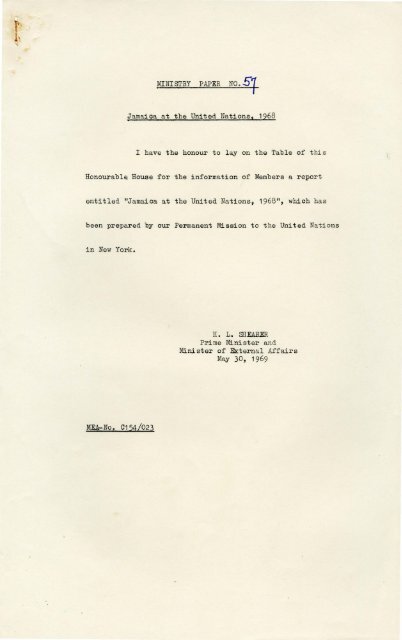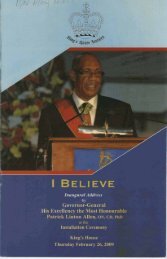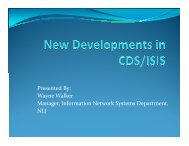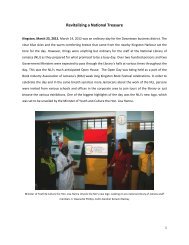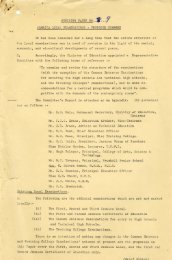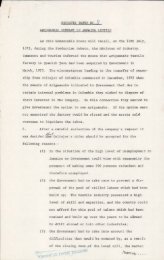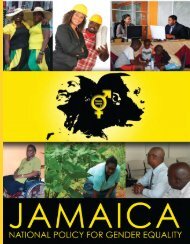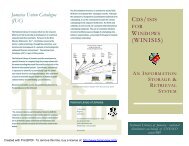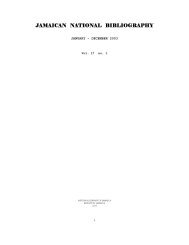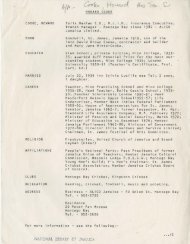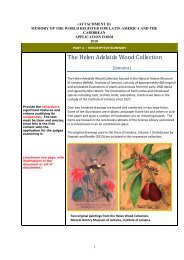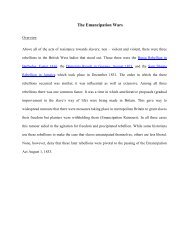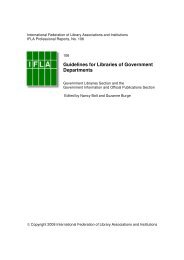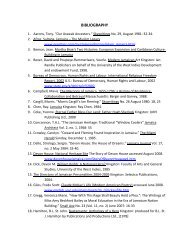MINISTRY PAPER N0. !)7 - The National Library of Jamaica
MINISTRY PAPER N0. !)7 - The National Library of Jamaica
MINISTRY PAPER N0. !)7 - The National Library of Jamaica
You also want an ePaper? Increase the reach of your titles
YUMPU automatically turns print PDFs into web optimized ePapers that Google loves.
<strong>MINISTRY</strong> <strong>PAPER</strong> <strong>N0.</strong> !)7<br />
J amaica at the United Nations, 1968<br />
I have the honour to lay on the Table <strong>of</strong> t hi s<br />
Honourable. House for the information <strong>of</strong> Members a report<br />
entitled "<strong>Jamaica</strong> at the United Nations, 1968 ", which ba s<br />
been prepared by our Permanent Mission to the United Nations<br />
in New York.<br />
H. L. SHEARER<br />
Prime Minister and<br />
Minister <strong>of</strong> Externa l Affairs<br />
May 30, 1969<br />
MEA-No. C1 54/023
- "":c ~ -------.<br />
- 9 -<br />
<strong>The</strong> Assembly established a permanent 42-member Committee<br />
on the Peaceful Uses <strong>of</strong> the Sea-bed and Ocean floor. <strong>The</strong> Latin<br />
American Group has seven members, one-third <strong>of</strong> whom will be on a twoyear<br />
rotation basis.<br />
THE PEOPLE 1 S REPUBLIC OF CHINA<br />
<strong>The</strong> question <strong>of</strong> the seating <strong>of</strong> the People's Republic <strong>of</strong><br />
China at the United Nations was again before the General Assembly.<br />
Three resolutions were put to the vote g<br />
(a) a resolution which affirmed the Assembly's previous<br />
decision that any proposal to change the representation<br />
<strong>of</strong> China was an important question requiring a<br />
two-thirds majority vote under the terms <strong>of</strong> Article<br />
18 <strong>of</strong> the United Nations Charter;<br />
<strong>The</strong> vote on this resolution was 73 in favour (including<br />
Jamaic a)~ 47 against and 5 abstentions;<br />
(b)<br />
a resolution to seat the People's Republic <strong>of</strong> China<br />
and to expel the representatives <strong>of</strong> "the Chiang Kai<br />
Shek clique"·<br />
<strong>The</strong> vote was 44 in favour, 58 against and 23 abstentions<br />
(including <strong>Jamaica</strong>);<br />
(c)<br />
a resolution calling for the establishment <strong>of</strong> a committee<br />
to study the situation and make recommendations.<br />
<strong>The</strong> vote was 30 in favour (including <strong>Jamaica</strong>), 67<br />
against and 37 abstentions.<br />
<strong>The</strong>re has been a steady decrease over the past four years in<br />
the number <strong>of</strong> states supporting the seating <strong>of</strong> the People's Republic<br />
<strong>of</strong> China. <strong>The</strong> figures show that in 1965 there were 47 states supporting,<br />
46 in 1966, 45 in 1967 and 44 in 1968.<br />
This question will undoubtedly appear on the agenda <strong>of</strong> the<br />
next session <strong>of</strong> the General Assembly.<br />
·~- -.<br />
CZECHOSLOVAKIA<br />
<strong>The</strong> Mission on the 26th August 1968, transmitted to the<br />
Secretary-General <strong>of</strong> the United Nations a note on behalf <strong>of</strong> the<br />
Government <strong>of</strong> <strong>Jamaica</strong> protesting the invasion <strong>of</strong> Czechoslovakia by<br />
~arsaw<br />
Pact troops, in violation <strong>of</strong> the United Nations Charter and the<br />
accepted rights <strong>of</strong> any State to territorial integrity and political<br />
independence.<br />
<strong>The</strong>re was an inconclusive debate on this question in the<br />
Security Council in September. <strong>The</strong> major powers, however, seemed to<br />
/have ••••
- 10 -<br />
have reached tacit agreement that the Czechoslovak situation should<br />
not be raised in the General Assembly and it was not raised as a separate<br />
item. <strong>The</strong> Czech Government also <strong>of</strong>ficially indicated that it<br />
did not want the matter discussed.<br />
THE SITUATION IN NIGERIA<br />
<strong>The</strong> Honourable E. L. Allen, Minister <strong>of</strong> Education, outlining<br />
<strong>Jamaica</strong>'s policy in a speech at the XXIII session <strong>of</strong> the General<br />
Assembly, referred to the civil war in Nigeria and called upon the<br />
international community to rally to that country's assistance with all<br />
the help which could be given towards the relief <strong>of</strong> its protracted<br />
suffering. <strong>Jamaica</strong>, he said, had already <strong>of</strong>fered a contribution <strong>of</strong><br />
£10,000 to the people <strong>of</strong> Nigeria through the International Red Cross.<br />
<strong>The</strong> Minister also said that "<strong>Jamaica</strong> would have this Assembly call<br />
upon both sides in Nigeria to put an immediate cease fire into effect.<br />
At the same time this Assembly should call upon all Member States <strong>of</strong><br />
the United Nations to cease supplying arms to either side in this conflict".<br />
INTERNATIONAL LAW COMMISSION<br />
<strong>The</strong> General Assembly celebrated the 20th Anniversary <strong>of</strong> the<br />
International Law Commission on the 4th November 1968, and Mr.<br />
Laurel Francis, the representative <strong>of</strong> <strong>Jamaica</strong> in the Sixth Committee<br />
was selected by the Latin American Group to speak on their behalf.<br />
MAURITIUS<br />
<strong>The</strong> Permanent Representative was present in the General<br />
Assembly at its meeting on 12th March 1968, to welcome Mauritius to<br />
the family <strong>of</strong> nations. <strong>Jamaica</strong> co-sponsored, along with 27 other<br />
Member States, a resolution which sought to admit Mauritius to membership<br />
<strong>of</strong> the United Nations, bringing the total membership then to 124.<br />
B. ECONOMIC AND SOCIAL<br />
In recent years there has been growing recognition in the<br />
international community that economic and social development are inextricably.<br />
related and that both are essential for the full enjoyment <strong>of</strong><br />
human rights. Further, it is affirmed each year in stronger terms by<br />
the developing countries that the United Nations' forma l commitment to<br />
promoting human rights constitutes a moral obligation on its developed<br />
member states to contribute more <strong>of</strong> their resources to international<br />
development programmes in order that the developing countries may<br />
enjoy wider economic and social rights.<br />
- -----·-<br />
This inter-relation has always been inherent in the structure<br />
<strong>of</strong> the United Nations Organization where economic, social and<br />
/human ••••
- 11 -<br />
human rights questions come under the purview <strong>of</strong> the Economic and<br />
Social Council.<br />
It is, however, only recently that the acknowledged<br />
inter-relation has begun to have practical results.<br />
As an example,<br />
the entire effort in the field <strong>of</strong> social development is currently<br />
being examined and reconstructed so that it will meet the needs and<br />
concerns <strong>of</strong> the developing cotmtries and that it will provide, instead<br />
<strong>of</strong> studies and statistics, practical assistance benefits to Member<br />
States in that sector.<br />
<strong>The</strong> impetus for this change <strong>of</strong> focus has come<br />
from the United Nations human rights commitment;<br />
ultimately it must be<br />
incorporated into more balanced and more practical general programmes<br />
to be undertaken in- the Second Development Decade.<br />
GENERAL ASSEMBLY ACTION IN THE ECONOMIC FIELD<br />
A number <strong>of</strong> resolutions containing implications for economic<br />
development were adopted by the XXIII session <strong>of</strong> the Generai Assembiy.<br />
Among those which <strong>Jamaica</strong> supported wereg<br />
(a) Multilateral__!.og_9:_!:!-dg This resolution emphasized the importance<br />
<strong>of</strong> multilatera l food aid to countries with a food deficit and the<br />
necessity for developing countries to increase production in the agricultural<br />
sector with a view to overcoming such shortages.<br />
(b) International Deve~Qpment Strategy~ <strong>The</strong> most important aspect<br />
<strong>of</strong> this resolution is the proposed establishment <strong>of</strong> a Preparatory Cornmi<br />
ttee ( t 'he enlargement <strong>of</strong> the Economic Committee <strong>of</strong> the Economic and<br />
Social Council) to formulate the international strategy for the forthooming<br />
Second Development Decad.e.<br />
(c) U.N. Capital D~velopment Fundg This resolution requested the<br />
United Nations Development Programme to identify specific projects<br />
which can benefit from investment out <strong>of</strong> th~xisting resources <strong>of</strong> the<br />
Fund.<br />
<strong>The</strong> resolution stressed the urgency <strong>of</strong> the commencement <strong>of</strong><br />
operation <strong>of</strong> the Fund .to aid in the economic development <strong>of</strong> underdeveloped<br />
countries.<br />
(d)<br />
International Education Year~ This resolution designated<br />
-- --<br />
1970 as International Education Year and requ,ested Member States and<br />
organizations <strong>of</strong> the United Nations system to plan their education<br />
policies and programmes for the Second Development Decade based on the<br />
"objective and themes <strong>of</strong> the International Education Year" as formulated<br />
by UNESCO in 1968.<br />
(e) External Financing <strong>of</strong> Economic Development: This resolution<br />
endorsed the recommendation <strong>of</strong> UNCTAD that each economically advanced<br />
country should endeavour to provide annually to developing countries a<br />
financial resources transfer <strong>of</strong> a minimum net amc~nt <strong>of</strong> one pe~ cent<br />
<strong>of</strong> its Gross <strong>National</strong> Product at market prices in terms <strong>of</strong> actual disbursements<br />
and that 1972 should be the target year for achieving this<br />
goal.<br />
/During •••
- 12 -<br />
During the debate, the representative <strong>of</strong> <strong>Jamaica</strong> made a plea<br />
for the provision <strong>of</strong> loans to developing countries which did not qualify<br />
for International Development Association (IDA) loans, at<br />
interest rates between the IDA rates and the World Bank rates, that is<br />
between three and four per cent. This proposal will most likely be<br />
further pursued at the forthcoming session in other United Nations<br />
bodies.<br />
THE ECONOMIC AND SOCIAL COUNCIL<br />
<strong>The</strong> Economic and Social Council is the highest organ in its<br />
field in the hierarchy <strong>of</strong> the United Nations; it concerns itself specifically<br />
with the formulation <strong>of</strong> principles and recommendations for<br />
the adoption <strong>of</strong> programmes <strong>of</strong> various aspects <strong>of</strong> international economic<br />
policy. <strong>The</strong> Council uses parallel methods in the social field, where<br />
it is supplied with preliminary work done by its many subsidiary organs,<br />
among them the Functional Commissions on Human Rights, Social Development<br />
and Population.<br />
<strong>Jamaica</strong> can contribute in several areas to the work <strong>of</strong> this<br />
Council. <strong>The</strong> practical benefits to be derived from membership are<br />
significant to a developing country such as ours. Attempts have been<br />
made by the Mission over the past four years to gain a seat for<br />
<strong>Jamaica</strong> on the Council. Success was achieved on the 19th November<br />
1968, when at a meeting <strong>of</strong> the General Assembly, <strong>Jamaica</strong> was elected<br />
for a three-year term to the Economic and Social Council, beginning<br />
on the 1st January 1969. A total <strong>of</strong> 109 votes was received from 116<br />
states present and voting which included the full support <strong>of</strong> the Latin<br />
American GrQup.<br />
UNITED NATIONS DEVELOPMENT PROGRAMME<br />
<strong>The</strong> 37-member Governing Council <strong>of</strong> the United Nations<br />
Development Programme (UNDP) provides general policy guidance for<br />
the UNDP and the United Nations Regular Programme <strong>of</strong> Technical Cooperation,<br />
and has also responsibility for the approval <strong>of</strong> Technical<br />
Assistance Projects and the administration <strong>of</strong> the Capital Development<br />
Fund. <strong>The</strong> UNDP is dedicated to one objective - increasing the<br />
development power <strong>of</strong> low-income countries. As a member <strong>of</strong> the<br />
Governin~<br />
Council for the three-year period 1966 to 1968, <strong>Jamaica</strong><br />
participated in the Fifth and Sixth sessions <strong>of</strong> th~t body during 1968.<br />
<strong>The</strong> Fifth Session was held at United Nations Headquarters, January 9-<br />
24 an4. the Sixth Session took place in Vienna from June 11 to 28. At<br />
both sessions <strong>of</strong> the Council Mr. Probyn W. Aitken attended as <strong>Jamaica</strong>'s<br />
repnesentative and was elected Rapporteur for both sessions.<br />
<strong>Jamaica</strong>'s project for the provision <strong>of</strong> a Food. Crops<br />
Development and Marketing Feasibility Survey was approved at the Fifth<br />
/Session
---<br />
- 13<br />
. .._ .. -·-- ·-----.... _<br />
.... ~<br />
... , ··-- ..<br />
__ ..___ .<br />
'',.., ---<br />
.. --· "·--.....<br />
- ----<br />
~--- - .-----·-<br />
- Session - the sum <strong>of</strong> $110,400 to·- be[)(n:ne..-by ·ths-UNDl' ~.,ii J~ M .oo .o.-<br />
__ .., ...<br />
tri buting -the- -~rrt--i.n .pounds <strong>of</strong> $137 •.()0(4 . Negoti.ations imdertaken<br />
by the Permanent Representative, on behalf <strong>of</strong> the Government with<br />
representatives <strong>of</strong> the UNDP facilitated the extension <strong>of</strong> the UNDf Project<br />
for Groundwater Investigation in <strong>Jamaica</strong> by 12 months to August<br />
This negotiation also helped to ensure the retention for one<br />
year <strong>of</strong> two specialists in Irrigation Engineeting and Hydrogeology,<br />
respectively, whose participation is vital for the auccess <strong>of</strong> the irrigation<br />
and underground water investigation programmes in specific areas<br />
<strong>of</strong> the Island.<br />
OTHER U.N. ASSISrrANCE TO JAMAICA<br />
Emergency Food Assistance<br />
As a result <strong>of</strong> the drought conditions affecting <strong>Jamaica</strong> last<br />
year, the Honourable Minister <strong>of</strong> Finance and Planning made a request<br />
for emergency food assistance through the UN/FAO/World Food Programme.<br />
On the 11th June 1968, the Prime Minister and Minister <strong>of</strong> External<br />
Affairs met with U.N. Secretary-General U Thant and discussed certain<br />
United Nations matters including Technical Assistance in the field <strong>of</strong><br />
training and <strong>Jamaica</strong>'s application to the World Food Programme.<br />
Permanent Representative was informed by the Secretary-General shortly<br />
after the Prime Minister's visit that the Director-General <strong>of</strong> the Food<br />
and Agriculture Organization had approved a total <strong>of</strong> 2,280 metric tons<br />
in food assistance to <strong>Jamaica</strong>.<br />
<strong>The</strong><br />
This food was subsequently shipped to<br />
<strong>Jamaica</strong> and distributed to people in the drought stricken areas.<br />
Small Craft Industry Project<br />
On the request <strong>of</strong> the Honourable Minister <strong>of</strong> Finance and<br />
Planning the Mission explored the possibility <strong>of</strong> securing assistance<br />
from UNIDO and the Special Fund to facilitate the expansion and development<br />
<strong>of</strong> the Craft Industry in <strong>Jamaica</strong>.<br />
This resulted in the proposal<br />
that a formal application should be made through the UNDP<br />
Representative in <strong>Jamaica</strong> for assistance in the designing <strong>of</strong> Phase II<br />
<strong>of</strong> the existing craft work programme.<br />
JAMAICA 1 S CONTRIBUTION TO 1968 U.N. REGULAR BUDGET AND<br />
OTHER VOLUNTARY CONTRIBUTIONS<br />
<strong>Jamaica</strong>'s scale <strong>of</strong> assessment for the year 1968 was 0.05%<br />
<strong>of</strong> the United Nations Regular Budget which amounted to $57,792.00.<br />
•<br />
In addition the following voluntary contributions were made:<br />
(a) United Nations Development Programme $65,000.00<br />
(b) United Nations Capital Development Fund • 3,000.00<br />
(c) United Nations Peace-keeping Force in<br />
in G,yprus 4,800.00<br />
(d)<br />
United Nations Consolidated Educational<br />
Training Programme for South Africa .. 840.00<br />
/<strong>The</strong> •••
- 14 -<br />
<strong>The</strong> Government <strong>of</strong> <strong>Jamaica</strong> in keeping with the spirit <strong>of</strong> a United<br />
Nations resolution vTbich, among other things, called upon _all States<br />
to 11 provide the necessal'y tnoral and material assistance to the<br />
Namibian people in their legitimate struggle for independence",<br />
<strong>of</strong>fe7ed to provide training to two Namibia.ns in <strong>Jamaica</strong>.<br />
RUMAN<br />
RIGHTS<br />
<strong>The</strong> year 1968 marked the 20th Anniversary <strong>of</strong> the Universal<br />
Declaration <strong>of</strong> Ruman Rights and was observed throughout the world a s<br />
the International Year for Human Rights. <strong>Jamaica</strong> participated fully<br />
in activities both at the national level and at the United Nations.<br />
On the Third Committee <strong>of</strong> the General Assembly, for example, Miss<br />
Enid Bennett, M.P. made a valuable contribution to the advancement <strong>of</strong><br />
the deliberations in the social, cultural and humanitarian fields.<br />
<strong>The</strong> work <strong>of</strong> the Commission on Ruman Rights, the International Conference<br />
on Human Rights, the Third Committee <strong>of</strong> the General Assembly and<br />
the many national and non-governmental efforts and observances were<br />
all aimed at promoting a wider acceptance <strong>of</strong> the provisions <strong>of</strong> the<br />
Universal Declaration by Member States, and were all part <strong>of</strong> the Unit ed<br />
Nations' wo~k towards achieving universal respect for the principles<br />
<strong>of</strong> human rights.<br />
<strong>The</strong> Commission<br />
<strong>The</strong> Commission on Human Rights met in New York in one session<br />
during 1968 from 5th February to 12th March. At this session<br />
Ambassador Keith Johnson was elected Vice-President.<br />
<strong>The</strong> Commission devoted the greater part <strong>of</strong> its session to<br />
questions <strong>of</strong> apartheid and racial discrimination in southern Africa<br />
and adopted four major resolutions on this item. <strong>Jamaica</strong> cosponsored<br />
one <strong>of</strong> these resolutions, (adopted unanimously) which is<br />
based on the report on prison conditions in the Republic <strong>of</strong> South<br />
Africa. <strong>The</strong> esolution listed a number <strong>of</strong> specific abuses in this<br />
aea identified by a group <strong>of</strong> legal experts appointed for the purpose,<br />
and called upon the Government <strong>of</strong> South Africa to rectify them.<br />
Later in the session, <strong>Jamaica</strong> was instrumental in securing<br />
a resolution on slaveY (there are estimated to be between two and<br />
four million people still living in slavery or involuntary servitude),<br />
This proposal, the first concrete measure to be adopted by the U.N. i n<br />
this field in several years, aimed at setting up machinery to give<br />
assistance, without publicity, to those states where there is still<br />
residual slavery and whose governments Wish U.N. advice and assistance<br />
in e~adicating it. During its session the Commission also took decisions<br />
on such questions as the change <strong>of</strong> size and composition <strong>of</strong> t he<br />
Sub-Commission on Prevention <strong>of</strong> Discrimination and Protection <strong>of</strong><br />
I .....
- 15 -<br />
Minorities on the rights <strong>of</strong> ciVilian populations in the oc 0upied territories<br />
<strong>of</strong> the Middle East and on the promotion <strong>of</strong> economic and social<br />
rights.<br />
INTERNATIONAL CONFERENCE ON HUMAN RIGHTS<br />
<strong>The</strong> International Conference on Ruman Rights wa s held in<br />
Tehran, Iran, from 22nd April to 13th May 1968, and was att ended by 84<br />
states including <strong>Jamaica</strong>, three United Nations bodies, four Specialized<br />
Agencies, four regional inter-governmental organizations and 48 nongovernmental<br />
organizations. <strong>Jamaica</strong> was represented at the Conference<br />
Mr. A. H. W.<br />
Williams, M.P.<br />
H.E. Sir Egerton Richardson,<br />
Ambassador to the United States<br />
H.E. Mr. Keith Johnson,<br />
Permanent Representative to the U.N.<br />
lllr. J. M. Lloyd,<br />
Permanent Secretary,<br />
Ministry <strong>of</strong> External Affairs<br />
Mr. Noel P. Silvera, M.P.<br />
Mr. L. B. Francis,<br />
Legal Adviser to the Ministry <strong>of</strong> External<br />
Affairs<br />
Mrs. Joyce Robinson,<br />
Director <strong>of</strong> the <strong>Jamaica</strong> <strong>Library</strong> Services<br />
Miss Marcella Martinez,<br />
Attache, Permanent Mission to the U.N.<br />
Head <strong>of</strong> the Delegation<br />
Presiding over t he Conference was the Princess Ashraf Pah:.avi <strong>of</strong> Iran.<br />
<strong>Jamaica</strong> was appointed a Vice-President.<br />
During his delivery <strong>of</strong><br />
<strong>Jamaica</strong>'s general statement on the opening day, Mr. Arthu:r Williams,<br />
M.P. conveyed to the Conference the greetings <strong>of</strong> the Hono u~able<br />
Prime<br />
Minister and the good wishes <strong>of</strong> the Government and people <strong>of</strong> <strong>Jamaica</strong>,<br />
as 1vell as his o·.vn personal greetings.<br />
On a subsequent occasion Mr.<br />
Williams made a moving speech on apartheid in which he called for new<br />
approaches by the U.N. to the problem aimed at drawing on the tremendous<br />
recent advances in the information media in order to bring people<br />
everywhere to a fuller realisation <strong>of</strong> the human tragedy and waste<br />
resulting from this policy <strong>of</strong> apartheid.<br />
Mr. Noel Silvera, M.P. played a prominent role in piloting<br />
a resolution which <strong>Jamaica</strong> co-sponsored with several delegations,<br />
advocating the establishment or enlargement by governments <strong>of</strong> systems<br />
<strong>of</strong> legal aid for those who needed it.<br />
<strong>The</strong> Conference considered a wide range <strong>of</strong> subje cts with<br />
human rights implications such as discrimination and colonialism<br />
(especially in southern Africa), the promotion <strong>of</strong> economie, social and<br />
cultural rights, disarmament,a long-term programme for the<br />
I ...
- 16 -<br />
advancement <strong>of</strong> women, the rights <strong>of</strong> children and youth, refugee problems~<br />
family planning, the need for legal aid, and the protection <strong>of</strong><br />
human rights in modern armed conflicts. At its conclusion the Conference<br />
unanimously adopted the Proclamation <strong>of</strong> Teheran which sets<br />
forth a consensus on the major human rights problems, in particular<br />
the obligation <strong>of</strong> the international community to promote and encourage<br />
respect for human rights and fundamental freedoms as defined in the<br />
Universal Declaration on Human Rights irrespective <strong>of</strong> race, colour,<br />
sex, language, religion, political or other opinions. It must be<br />
stressed, as was said by the Permanent Representative in his address<br />
to the Third Committee on December 2, 1968, on the International Year<br />
for Human Rights, that "the Proclamation is not simply a restatement<br />
<strong>of</strong> the Universal Declaration. It is a contemporary statement <strong>of</strong> the<br />
realities confronting the world today, breaking new ground with a number<br />
<strong>of</strong> quite remarkable pronouncements. It introduces a new principle<br />
into international development by calling for individual national<br />
effort from all nations to help close the gap between rich and poor.<br />
It is the first international statement which, at the highest level,<br />
demands an appropriate share for youth in the shaping <strong>of</strong> mankind's<br />
future. It recognizes as legitimate the continuing struggle against<br />
apartheid. It takes a positive stand on the question <strong>of</strong> population<br />
growth. It calls our attention to the human rights problems inherent<br />
in the very technology <strong>of</strong> which mankind is so proud. It lays claim<br />
to the resources released by disarmament~ not only for economic development<br />
as in the past, but for the promotion <strong>of</strong> human rights. It<br />
correctly identifies the eradication <strong>of</strong> racial discrimination as "a<br />
most urgent task <strong>of</strong> mankind". It is, in fact, the Ambassador concluded,<br />
"a challenge to all, and a stirring invitation to ensure that its<br />
pronouncements are invested with the importance and the influence they<br />
deserve".<br />
<strong>The</strong> adoption <strong>of</strong> the Report <strong>of</strong> the Conference (Final Act) was<br />
agreed to by the General Assembly at its XXIII session.<br />
INTERNATIONAL DAY FOR THE ELIMINATION OF RACIAL DISCRIMINATION<br />
At a special meeting organized by the Special Committee on<br />
the Policies <strong>of</strong> Apartheid <strong>of</strong> the Government <strong>of</strong> South Africa, the 21st<br />
<strong>of</strong> March 1968, was observed as the International Day for the Elimination<br />
<strong>of</strong> Racial Discrimination. Ninety-six representatives <strong>of</strong> Member<br />
States and members <strong>of</strong> the Human Rights Commission attended, and a<br />
minute <strong>of</strong> silence was observed in memory <strong>of</strong> victims <strong>of</strong> racism everywhere.<br />
Statements were made by the Secretary-General and representatives<br />
including Ambassador Keith Johnson in his capacity as Vice<br />
Chairman <strong>of</strong> the Commission on Human Rights. <strong>The</strong> Ambassador stated,<br />
inter alia, that the "international community could not allow racial<br />
I .. ...
1...<br />
- 17 -<br />
discrimination among men, for only in a world where human beings were<br />
equally valued irrespective <strong>of</strong> race, would the goals <strong>of</strong> the United<br />
Nations Organization have any hope <strong>of</strong> attainment".<br />
MARCUS GARVEY PRIZE<br />
<strong>The</strong> Government 9<br />
in 1966, decided that one <strong>of</strong> the ways in<br />
which <strong>Jamaica</strong> would mark the International Year was by the award <strong>of</strong> a<br />
Pri ze for Human R:L g ht s. <strong>The</strong> Prize would be named after one <strong>of</strong><br />
<strong>Jamaica</strong>'s nationa l heroes-- Marcus Garvey- would carry a cash award <strong>of</strong><br />
£5,000, and would be awarded for outstanding contribution in the field<br />
<strong>of</strong> race relations. <strong>The</strong> Government through the Mission circulated the<br />
governments <strong>of</strong> Member States and Observer Missions as well as the Specialized<br />
Agencies and the Non-Governmental Organizations, details <strong>of</strong><br />
the Code <strong>of</strong> Procedure agreed upon, and requested their nominations.<br />
Following announcement <strong>of</strong> the award <strong>of</strong> the Prize to the late Dr.<br />
Martin Luther King~ _ the Mission notified all the Governments and<br />
Organizations <strong>of</strong> the award.<br />
HUMAN RIGHTS DAY<br />
<strong>The</strong> Twentieth Anniversary <strong>of</strong> the Universal Declaration <strong>of</strong><br />
Human Rights was observed on the 9th December at a special meeting <strong>of</strong><br />
the General Assembly. Among those addressing the gathering were<br />
Princess Ashraf Pahlavi <strong>of</strong> Iran, President <strong>of</strong> the International Conference<br />
on Human Rights, the President <strong>of</strong> the Economic and Social<br />
Council, Mr. Manuel Perez Guerrero <strong>of</strong> Venezuela, the Chairman <strong>of</strong> the<br />
Commission on Huma.n Rights 9<br />
Mr. Ibrahima Boye <strong>of</strong> Senegal and the<br />
Chairman <strong>of</strong> the Sub-Commission on the Prevention <strong>of</strong> Discrimination and<br />
Protection <strong>of</strong> Mi r cri ties, Mr. Pierre Juvigny <strong>of</strong> France. At this meeting<br />
the six prizes for Human Rights were awarded to Manuel Bianchi<br />
(Chile), Mrs. Mehranguiz Manoutchehrian (Iran) 1 Peter EmelyanoVich<br />
Nedbailo (Ukraine) 9 Rene Ca ssin (France) and posthumously to Mrs.<br />
Eleanor Roosevelt (U.S.A.) and Chief Albert Luthuli (South Africa).<br />
A number <strong>of</strong> countries, including <strong>Jamaica</strong>, sent messages commemorating<br />
the 20th Anniversary. <strong>The</strong> Honourable Prime Minister and<br />
Minister <strong>of</strong> External Affairs <strong>of</strong> <strong>Jamaica</strong>'s message noted that during the<br />
International Year "Nations, organizations and individuals all around<br />
the world have seized the opportunity to measure and assess the progress<br />
made over the past two decades towards the realization <strong>of</strong> the<br />
ideals embodied in the Declaration, and, at the same time, to take<br />
stock <strong>of</strong> all that yet remains to be done" ••••• "As a member <strong>of</strong> the<br />
United Nations 9 <strong>Jamaica</strong> can feel a certain justifiable pride in the<br />
achievements which have been secured by that Organization in certain<br />
areas, but we are also sharply aware that, in other areas, progress<br />
has been negligible. <strong>The</strong> world has, in fact, a long way to go before<br />
it can be said to have attained the happy state in which the "inherent<br />
/dignity •••
.... 18 -<br />
dignity-- the equal and inalienable rights <strong>of</strong> all members <strong>of</strong> the<br />
human family-- enjoy universal respect."<br />
J AM.AI C.A LAUDED AT THE U.N.<br />
<strong>The</strong> <strong>Jamaica</strong>n initiative which resulted in the designation<br />
by the U.N. <strong>of</strong> 1968 as International Year for Human Rights received<br />
high praise from a number <strong>of</strong> member nations in the various statements<br />
made before the General Assembly's Third Committee.<br />
<strong>The</strong> United Kingdom's representative, Lady Gaitskell, in her<br />
statement on the International Year, began by paying tribute to the<br />
Government <strong>of</strong> <strong>Jamaica</strong>, "on whose initiative 1968 was designated as<br />
Human Bights Year 11 • Lady Gaitskell continued~ "<strong>The</strong> <strong>Jamaica</strong>n delegation<br />
deserves its reputation as a watchdog for Human Rights ••• "<br />
Attorney Gener~l Ramphal <strong>of</strong> Guyana made the following comment<br />
before the General Assembly: "This is the International Year for Human<br />
Rights- a Year I am happy to recall, initiated on a proposal by a<br />
fellow Caribbean State, <strong>Jamaica</strong> - and I cannot leave this area <strong>of</strong> my<br />
remarks without placing on record the admiration <strong>of</strong> my Government for<br />
the efforts <strong>of</strong> this organization and <strong>of</strong> the many non-governmental<br />
organizations associated with it in the area <strong>of</strong> Human Rights. We<br />
believe that the dedicated work which has been done in advancing the<br />
cause <strong>of</strong> Human Rights throughout the world has already served to<br />
awaken the consciences <strong>of</strong> millions to the injustices which exist, to<br />
the urgency <strong>of</strong> the need for change and, perhaps most important <strong>of</strong> all,<br />
to the righteousness and the legitimacy <strong>of</strong> change ••• "<br />
New Zealand's representative included in her statement before<br />
the Third Committee the comment that her "delegation was<br />
impressed with the national Human Rights programmes undertaken by<br />
Member States during 1968", and, in specific reference to <strong>Jamaica</strong>,<br />
she spoke in the following terms: "if I may single out one .fjrogrammi}<br />
in particular, it might be that <strong>of</strong> <strong>Jamaica</strong>, to whom we owe the idea<br />
for this International Year and whose Government and people have<br />
demonstrated that they are ready to give thorough and practical expression<br />
to the goals they are so ably promoting on the international<br />
level".<br />
CONFERENCE OF MINISTERS RESPONSIBLE FOO SOCIAL vlELF.ARE<br />
All Member States <strong>of</strong> the United Nations and its related<br />
agencies were invited by the Secretary-General to participate in an<br />
International Conference <strong>of</strong> Ministers responsible for Social Welfare<br />
which was held at the United Nations Headquarters from September 3 to<br />
September 12, 1968.<br />
/<strong>The</strong> •••••
JAMAICA AT THE UNITED NATIONS, 1968<br />
Part I: <strong>The</strong> United Nations in 1968<br />
<strong>The</strong> United Nations is a sensitive barometer <strong>of</strong> the situation<br />
in the world at large. In a year when the balance <strong>of</strong> power is threatened,<br />
when future policies <strong>of</strong> the great powers are in doubt, when the<br />
small powers are forced to entertain serious doubts about the value <strong>of</strong><br />
the role they have attempted to play, the United Nations as such, cannot<br />
move significantly forward. At such a time it must take the<br />
opportunity instead to examine where it stands at the moment, to make<br />
adjustments in its policies and programmes which will more accurately<br />
reflect the realities <strong>of</strong> international conflicts and, if possible, to<br />
strenghten, expand and clarify the bases on which its current activities<br />
rest. 1968 was such a year. Great power activities in South<br />
East Asia, Central Europe and the Middle East, the uncertainty <strong>of</strong> the<br />
future course <strong>of</strong> policy owing to factors such as the American Presidential<br />
elections and the general monetary crisis, civil convulsions in<br />
the developed world, all contributed to a fluid state <strong>of</strong> alliances at<br />
the United Nations and therefore militated against the Organization's<br />
taking any significant new steps. <strong>The</strong>re was, at the same time, an<br />
increased tendency within the United Nations to examine the nature and<br />
value <strong>of</strong> its work. Delegations, aware <strong>of</strong> the growing credibility gap<br />
between the United Nations and the Public at large, were constrained<br />
in several areas to take a searching look at the kinds <strong>of</strong> action the<br />
United Nations had so far taken to solve its most pressing problems.<br />
Were these sufficiently adequate and timely Or, wer ~ alternative<br />
measures required One heard repeated calls for "new approaches" -<br />
in solving growing economic problems, in reducing the danger <strong>of</strong> polical<br />
confrontations, in opposing the policies <strong>of</strong> apartheid.<br />
At the XXIII Session <strong>of</strong> the General Assembly there was no<br />
new proposal as imaginative as the 1967 Maltese proposal for the<br />
"Examination <strong>of</strong> the Question <strong>of</strong> the Reservation Exclusively for Peaceful<br />
Purposes <strong>of</strong> the Sea-bed and the Ocean Floor, and the Sub-soil<br />
<strong>The</strong>re<strong>of</strong>, Underlying the High Seas Beyond the Limits <strong>of</strong> Present<br />
<strong>National</strong> Jurisdiction, and the Uses <strong>of</strong> <strong>The</strong>ir Resources in the Interests<br />
<strong>of</strong> Mankind". However, that proposal which had been debated during<br />
the XXII Session resulted in the formation <strong>of</strong> an ad hoc committee<br />
which reported to the XXIII Session <strong>of</strong> the General Assembly. <strong>The</strong><br />
debate on the report <strong>of</strong> the ad hoc committee led to the formation <strong>of</strong><br />
a Permanent Committee which would study legal principles and norms<br />
and the economic and technical aspects <strong>of</strong> the entire proposal. This<br />
Committee is expected to spend a long time on its work.<br />
<strong>The</strong> meetings <strong>of</strong> the Security Council were dominated, for<br />
the most part, by discussions on the Middle East and on the question<br />
/<strong>of</strong> •••
- 19 -<br />
<strong>The</strong> Conference was called by the Economic and Social Council<br />
for the purpose <strong>of</strong> examining the role <strong>of</strong> social welfare programmes in<br />
nationa l development and to make recommendations for further United<br />
Nations action in this field.<br />
<strong>Jamaica</strong> 1 s representatives to the Conference were:<br />
<strong>The</strong> Hon. Allan Douglas<br />
Minister <strong>of</strong> Youth and Community<br />
Development<br />
Mr. Hector Gibson<br />
Chairman, Social Development<br />
Commission<br />
Mrs. Winnifred Hewitt<br />
Chief Children 1 s Officer<br />
Miss Marcella I4artinez<br />
Attache, Permanent Mission to the<br />
United Nations<br />
Leader <strong>of</strong> Delegation<br />
Representative<br />
Representative<br />
Adviser.<br />
In an address to the Conference on the 6th September, the<br />
Honourable Allan Douglas spoke <strong>of</strong> J amaica's experience in the field <strong>of</strong><br />
social welfare, its achievements, and recognition <strong>of</strong> the need for further<br />
social and economic development which would involve particularly<br />
the youth'<strong>of</strong> the country. He referred to the problems <strong>of</strong> the mentally<br />
and physically handicapped in the national development because<br />
<strong>of</strong> the lack <strong>of</strong> trained personnel in this field. This, he said, was<br />
one <strong>of</strong> the areas in which assistance may have to be requested by<br />
<strong>Jamaica</strong> from the internationa l organizations.<br />
Mrs. Hewitt was appointed to serve on one <strong>of</strong> the four Technical<br />
Commissions set up by the Conference and was unanimously elected<br />
its Rapporteur.<br />
C. INTERNATIONAL AGREEMENTS 1<br />
MEMBERSHIP, ETC.<br />
CONVENTIONS AND AGREEMENTS<br />
<strong>Jamaica</strong> became a party to the following Conventions and<br />
Agreements during the year:<br />
(a)<br />
(b)<br />
(c)<br />
(d)<br />
<strong>The</strong> Instrument <strong>of</strong> Accession to the 1930 Protocol<br />
relating to a certain Case <strong>of</strong> Statelessness was<br />
deposited on June 12, 1968.<br />
<strong>The</strong> 1968 International C<strong>of</strong>fee Agreement was signed<br />
on 17th September 1968.<br />
<strong>The</strong> Instrument <strong>of</strong> Accession to the 1948 Convention<br />
on the Prevention and Punishment <strong>of</strong> the Crime <strong>of</strong><br />
Genocide was deposited on 23rd September 1968.<br />
<strong>The</strong> International Sugar Agreement was signed on<br />
27th December 1968.<br />
I ....
- 20-<br />
MEMBERSHIP ,ON U.N. BODIES AND .RELATED<br />
ORGANl.ZATIONS<br />
<strong>Jamaica</strong> held membership on the folloWing United Nations Commissions,<br />
Committees and Boards during 1968g<br />
Committee on Conferences<br />
Committee on Manufactures <strong>of</strong> UNCTAD<br />
Commission on Narcotic Drugs<br />
Commission on Human Rights<br />
Population Commission<br />
Economic Commission for Latin America<br />
Trade and Development Board<br />
Governing Council <strong>of</strong> the United Nations Development<br />
Programme.<br />
Meetings <strong>of</strong> the Committee on Conferences, the Commission on Human<br />
Rights and the Governing Council <strong>of</strong> the United Nations Development<br />
Programme were attended by representatives <strong>of</strong> the Mission.<br />
Specialized Agencies<br />
.<strong>The</strong> following are the Specialized Agencies on which <strong>Jamaica</strong><br />
has permanent membership:<br />
Other Agencies<br />
International Labour Organization<br />
Food and Agricultural Organization<br />
(<strong>Jamaica</strong> has been elected to the World Food Programme<br />
for the period 1968-1970)<br />
United Nations Educational Scientific and Cultural<br />
Organization<br />
World Health Organization<br />
( Membership on the Executive Board <strong>of</strong> the World<br />
Health Organization for 1968/69- 1970/71)<br />
International Bank for Reconstruction and Development<br />
International Finance Corporation<br />
International Civil Aviation Organization<br />
Universal Postal Union<br />
International Telecommunication Union<br />
World Meteorological Organization.<br />
International Atomic Energy Agency<br />
General Agreement on Tariffs and Trade<br />
<strong>The</strong> headquarters <strong>of</strong> many <strong>of</strong> the abovementioned Specialized<br />
Agencies are located in Europe.<br />
<strong>Jamaica</strong>'s interests on these bodies<br />
are met by the Permanent Mission <strong>of</strong> <strong>Jamaica</strong> to the European Office and<br />
to the Specialized Agencies <strong>of</strong> the United Nations in Geneva.<br />
Mission in New York is required to perform complementary liaising<br />
functions, primarily on aspects <strong>of</strong> the programmes <strong>of</strong> the Specialized<br />
Agencies in which the United Nations Headquarters is more or less<br />
directly involved.<br />
/Part ••<br />
<strong>The</strong>
- 21 -<br />
Part III: Administration<br />
Members . <strong>of</strong> the staff o'f the -Mission_- diploma.tic and nondiplomatic<br />
- perform&d--t.heir--duties well, displaying loyalty, willill8'-<br />
ness and devotion to duty all <strong>of</strong> which contributed to the smooth and<br />
ef.:t'eot.i:ve--·fu.notioning <strong>of</strong> the Mission.<br />
•<br />
·LECTURES<br />
Ci vi c--organ.i.sat.i.ona -..a.niL educa tional- il:lstituticns ...in-th.a--New:.----<br />
York area and as far afield as Los Angeles, California, displayed a<br />
keen interest in <strong>Jamaica</strong>, her role at the United Nations, particularly<br />
in the field <strong>of</strong> human rights. Members <strong>of</strong> the diplomatic staff were<br />
<strong>of</strong>ten requested to participate in seminars and forums on international<br />
issues i3Jld/ -to. deliver -addresses on <strong>Jamaica</strong> t s policy at home and abroad.<br />
In the case <strong>of</strong> Los Angeles, the Permanent Representative, at the invitation<br />
<strong>of</strong> the Los Angeles County . Opt-ometric -Society.,-- Y.i.si ted. tb.a.t---ci'tyafiQ<br />
addressed the annual meeting <strong>of</strong> the Society on the 20th June 1968.<br />
On that occasion the Ambassador had the opportunity <strong>of</strong> meeting with<br />
several members <strong>of</strong> the <strong>Jamaica</strong>n and West Indian community.<br />
DIPLOMATIC<br />
RELATIONS<br />
Diplomatic and Consular relations were formally established<br />
between <strong>Jamaica</strong> and the Socialist Federal Republic <strong>of</strong> Yugoslavia on<br />
the 11th <strong>of</strong> October 1968, by an Exchange <strong>of</strong> Notes at the Permanent<br />
Mission <strong>of</strong> <strong>Jamaica</strong> to the U.N. between Ambassador Keith Johnson and<br />
Ambassador Anton Vratusa, Permanent Representative <strong>of</strong> the Soeialist<br />
Federal Republic <strong>of</strong> Yugoslavia to the United Nations.<br />
As a gesture <strong>of</strong> goodwill, Ambassador Vratusa held a Reception<br />
at his Mission on Friday, 15th November, for the members <strong>of</strong> the<br />
<strong>Jamaica</strong>n delegation to the XXIII General Assembly session and <strong>of</strong> the<br />
Mission.<br />
Members <strong>of</strong> the Yugoslavian delegation and Mission staff<br />
were present and acted as hosts.<br />
RELATIONS WITH MEMBER STATES<br />
<strong>The</strong> Mission maintained cordial relations with, and worked<br />
closely with the Caribbean States Members <strong>of</strong> the United Nations and<br />
the Latin American States.<br />
Particularly on economic questions <strong>of</strong> common concern the<br />
Mission has maintained close working relationship with the Group <strong>of</strong> 77.<br />
<strong>Jamaica</strong>'s participation as a member <strong>of</strong> ECOSOC and <strong>of</strong> the<br />
Preparatory Committee for the Second Development Decade will facilitate<br />
the strengthening <strong>of</strong> the bonds between the developing countries<br />
as they accelerate their quest for those approaches that will lead to<br />
the attainment <strong>of</strong> urgently needed economic and social goals -<br />
to peace and security.<br />
the key
- 2 -<br />
<strong>of</strong> Rhodesia. In the case <strong>of</strong> Rhodesia 9 a resolution was unanimously<br />
adopted agreeing to impose more effective sanctions against the illegal<br />
racist regime <strong>of</strong> Ian Smith.<br />
<strong>The</strong> XXIII Session <strong>of</strong> the General Assembly was convened at<br />
Headquarters on 24th September and adjourned three months later on<br />
21st December. In the General Debate, Member States devoted more<br />
attention to the social and economic problems, making less detailed<br />
reference to current world problems such as Viet Nam. <strong>The</strong> invasion<br />
<strong>of</strong> Czechoslovakia by the USSR and the deteriorating conditions in<br />
Nigeria/Biafra were only mentioned briefly. It was, however, plainly<br />
perceptible that events in the Middle East and Czechoslovakia had contributed<br />
to a serious setback <strong>of</strong> the detente in East/West relations.<br />
This worsening <strong>of</strong> relations was emphasized by the halt in ratifications<br />
<strong>of</strong> the Non-Proliferation Treaty - one <strong>of</strong> the greatest achievements <strong>of</strong><br />
the United Nations in its efforts to stem the spread <strong>of</strong> nuclear weapons<br />
- by the great powers.<br />
<strong>The</strong>re emerged also, in some cases for the first time, references<br />
to a large number <strong>of</strong> disputes: Guyana/Venezuela; the<br />
Philippines/Malaysia over Sabah; Pakistan/Afghanistan over<br />
Padhtunistan; Argentina/United Kingdom over the Malvinas; Guatemala's<br />
claim to Belice; and the United Kingdom/Spain dispute over Gibraltar.<br />
<strong>The</strong> Economic and Social Council took the necessary steps to<br />
expedite the preliminary work and to intensify national and international<br />
efforts to formulate a dynamic international policy for the<br />
second United Nations Development Decade. <strong>The</strong> United Nations must<br />
indeed advance its relentless efforts to improve the social and economic<br />
conditions throughout the world and to maintain international<br />
peace and security.<br />
Consequent on the decrease in the number <strong>of</strong> trust territories<br />
under its administration, the Trusteeship Council was faced with<br />
the inevitable decision to review its composition and its role. This<br />
matter is still under consideration. <strong>The</strong> most recent trust territory<br />
to be brought to independence by the Council in January <strong>of</strong> 1968 was<br />
Nauru.<br />
Considerable credit must be given to Secretary-General<br />
U Thant, for his unstinting efforts to promote peace and international<br />
goodwill. <strong>The</strong> recourse to quiet diplomatic initiatives on his part<br />
and through his representatives - Gunnar Jarring in the Middle East<br />
and Nils-Goran Gussing in Nigeria - are a manifestation <strong>of</strong> his valuable<br />
services to the world community.<br />
Of parallel importance during 1968 was the convening <strong>of</strong> four<br />
major United Nations Conferences<br />
/ (a) •••
- 3 -<br />
(a}-- -<strong>The</strong> In-ter.n.a..tional .Con.fere.n.ce on H-t,unan Rights;<br />
.{b)-- ·<strong>The</strong> Con.f ·~rence on Non....;Nucl-ear Weapon Sta.tes;<br />
(c) <strong>The</strong> Conference on the Law <strong>of</strong> Treaties; and<br />
(d) <strong>The</strong> United Nations Sugar Conference.<br />
<strong>The</strong> International Conference on Human Rights which met in Tehran, Iran,<br />
in April/May, emphasized the need for a dynamic and better-planned<br />
approach by States to the problems <strong>of</strong> human rights. Embodied in its<br />
final Proclamation are the hopes and aspirations <strong>of</strong> 84 participating<br />
States for world-wide promotion and acceptance <strong>of</strong> human rights and<br />
fundamental freedom.<br />
<strong>The</strong> Conference <strong>of</strong> Non-Nuclear Weapon States held in Geneva, August/<br />
September, has been regarded not only by the smaller nations but also<br />
by the four great pov.rers vlhich attended as observers, as having contributed<br />
to a wider understanding <strong>of</strong> the problems <strong>of</strong> the peaceful uses<br />
<strong>of</strong> nuclear energy, disarmament and the control <strong>of</strong> nuclear weapons.<br />
<strong>The</strong> United Nations Conference on the Law <strong>of</strong> Treaties met in Vienna<br />
from March 26 to May 24, 1968, and reviewed a draft Convention which<br />
lays down rules <strong>of</strong> law governing conclusion, interpretation, validity<br />
and termination <strong>of</strong> treaties between States. <strong>The</strong> Conference will hold<br />
its second session in 1969 , at which time conclusion and ratification<br />
<strong>of</strong> the Convention is anticipated.<br />
<strong>The</strong> United Nations Sugar Conference convened on April 17 to June 1 and<br />
met again from September 23 to October 24 9 under the chairmanship <strong>of</strong><br />
the Honourable Robert Lightbourne, Minister <strong>of</strong> Trade and Industry <strong>of</strong><br />
<strong>Jamaica</strong>. At its conclusion the Conference adopted the text <strong>of</strong> an<br />
International Sugar Agreement which was submitted to Governments for<br />
consideration. <strong>The</strong> Agreement was open for signature at United Nations<br />
Headquarters from 3rd to 24th December and the deposit <strong>of</strong> ratification<br />
or notification there<strong>of</strong> was required by 31st December 1968, to enable<br />
the Agreement to come into force on 1st January 1969. This was<br />
achieved. <strong>The</strong> Agreement is designed to bring world production and<br />
consumption <strong>of</strong> sugar into closer balance at prices above present low<br />
levels. It aims at maintaining a stable price for sugar and at discouraging<br />
expansion <strong>of</strong> production by developed count~ies in order to<br />
benefit the developing countries which depend largely on the export<br />
<strong>of</strong> this commodity.<br />
Membership <strong>of</strong> the United Nations rose in 1968 to 126 with<br />
the admittance <strong>of</strong> r~uritius, Equatorial Guinea, Swaziland and the<br />
Southern Yemen.<br />
/Part II: ••• ,
- 4 -<br />
Part II: <strong>Jamaica</strong> at the United Nations in 1968.<br />
Throughout the year 1968, the Mission continued to benefit<br />
from sustained consultations with the Ministry <strong>of</strong> External Affairs and<br />
from the policy guidelines set forth by the Ministry. <strong>The</strong> Permanent<br />
Representative and other members <strong>of</strong> the Mission engaged in a considerable<br />
amount <strong>of</strong> research, study, and liaison with the United Nations<br />
Secretariat and diplomatic personnel <strong>of</strong> other Missions, in order to<br />
prepare briefs and documentation for the Ministry <strong>of</strong> External Affairs<br />
and to effectively participate in the work <strong>of</strong> the United Nations. A<br />
summary follows <strong>of</strong> the SECURITY AND POLITICAL 9 ECONOMIC ./l.ND SOCIAL<br />
MATTERS, in which the Mission took a keen interest.<br />
A. SECURITY AND POLITICAL<br />
THE SECURITY COUNCIL<br />
Southern Rhodesia<br />
In a Note to the President <strong>of</strong> the Security Council dated 16th<br />
March 1968, the Permanent Representative on behalf <strong>of</strong> <strong>Jamaica</strong>, supported<br />
the request <strong>of</strong> 36 African States that the Security Council convene<br />
a meeting to consider the situation in Southern Rhodesia, specifically<br />
the execution <strong>of</strong> 33 black Rhodesians after the Queen had granted a<br />
reprieve. This meeting took place on the 20th March 1968, and<br />
Ambassador Johnson in his statement to the Council, deplored "the permissiveness<br />
<strong>of</strong> Governments which support the Smith regime by refusing<br />
to enforce sanctions against Rhodesia 11 • He informed the Counci 1 that<br />
the people <strong>of</strong> <strong>Jamaica</strong> through Parliament had unanimously adopted a<br />
resolution which took note <strong>of</strong> the "utter failure <strong>of</strong> the sanctions so<br />
far imposed on Southern Rhodesia". <strong>The</strong> Government <strong>of</strong> <strong>Jamaica</strong> in<br />
this resolution supported the use <strong>of</strong> force to overthrow the illegal<br />
regime <strong>of</strong> Ian Smith. At a later session held in May the question <strong>of</strong><br />
Rhodesia was again discussed and a resolution calling for the imposition<br />
<strong>of</strong> mandatory sanctions on Rhodesia was unanimously adopted.<br />
Complaint oy the Republic <strong>of</strong> Haiti<br />
<strong>The</strong> Security Council met to consider a complaint by the<br />
Republic <strong>of</strong> Haiti that it had been the victim <strong>of</strong> aggression. In a<br />
letter to the Secretary-General, the Permanent Representative <strong>of</strong><br />
Haiti had stated that Port-au-Prince had been bombed by a pirate plane,<br />
the target being the private apartments <strong>of</strong> the Head <strong>of</strong> State. <strong>The</strong><br />
letter went on to say that the territories from which the aircraft<br />
were most likely to have operated were the United States, Cuba,<br />
<strong>Jamaica</strong>, the Dominican Republic or the Bahamas. <strong>The</strong> Representative<br />
<strong>of</strong> Haiti in his address to the Council did not mention <strong>Jamaica</strong> and<br />
there was no debate.<br />
/<strong>The</strong> •••
- 5-<br />
<strong>The</strong> President <strong>of</strong> the Council read into the records letters<br />
from the Permanent Representative <strong>of</strong> <strong>Jamaica</strong> and the Permanent Representative<br />
<strong>of</strong> the Dominican Republic.<br />
<strong>The</strong> <strong>Jamaica</strong>n letter stated that<br />
<strong>Jamaica</strong> had already informed the Haitian Consul in Kingston that<br />
<strong>Jamaica</strong> was not a base from which any aircraft had operated to bomb<br />
the Republic <strong>of</strong> Haiti.<br />
any infringement <strong>of</strong> Haiti's sovereignty.<br />
THE GENERAL ASSEMBLY<br />
Rhodesia<br />
<strong>The</strong> Dominican Republic's letter also denied<br />
<strong>The</strong> Mission participated in deliberations in the Fourth Committee<br />
<strong>of</strong> the General Assembly's XXIII session on the question <strong>of</strong><br />
Rhodesia.<br />
<strong>Jamaica</strong>'s stand had already been made known in earlier<br />
statements in the United Nations and was again stated by Mr. Hugh<br />
Bennick, the representative <strong>of</strong> <strong>Jamaica</strong> in the Fourth Committee, in<br />
debate on October 16.<br />
<strong>The</strong> salient points <strong>of</strong> his address were-<br />
(1) It might be <strong>of</strong> value to consider effective ways and<br />
means <strong>of</strong> applying restrictions on communication facilities-<br />
postal, air, and sea- despite the inherent<br />
d.iffi cul ties.<br />
(2) <strong>The</strong> co-operation <strong>of</strong> the major powers was needed to<br />
implement any meaningful resolution on Rhodesia.<br />
(3) Since comprehensive sanctions appeared doomed to<br />
failure, the United Kingdom should employ whatever<br />
force was needed to ensure the fundamental rights<br />
<strong>of</strong> the majority population.<br />
(4) <strong>The</strong> <strong>Jamaica</strong>n Government felt that any settlement<br />
would need to take into account the No Independence<br />
Before Majority African Rule (NIBMAR) pledge which<br />
was made to the Commonwealth Prime Ministers in<br />
1966, and such settlement would need to be on the<br />
basis <strong>of</strong> Universal Adult Sufferage.<br />
(5) All Member States should withhold recognition <strong>of</strong><br />
Rhodesia as an independent state if NIBMAR and<br />
Universal Adult Sufferage were not included in<br />
any settlement that was reached.<br />
In the Committee, the majority <strong>of</strong> Commonwealth countries condemned<br />
the United Kingdom for inaction in settling the Rhodesian problem,<br />
Apart from certain Nordic countries and a few others the consensus<br />
was -<br />
/ (a) •••
- 6 -<br />
( a ) that t he United Kingdom should not grant independence<br />
to Southern Rhodesia unle ss it is preceded by the<br />
establishment <strong>of</strong> a government ba sed on free elections<br />
by uriversal adult suffrage, and on majority rule;<br />
(b)<br />
no State should recognize any form <strong>of</strong> independence in<br />
Rhodesia without the prior establishment <strong>of</strong> a government<br />
based on ma jority rule.<br />
<strong>The</strong>se provisions which originated in J amaica's policy speech, formed<br />
the basis <strong>of</strong> t he text <strong>of</strong> a draft resolution which was approved by the<br />
General Assembly .<br />
APARTHEJ:D<br />
In the general debate <strong>of</strong> the Fourth Committee at the XXIII<br />
session <strong>of</strong> the Genera l Assembly, on the question <strong>of</strong> decolonization,<br />
Dr. Neville Gallimore, M.P. spoke on the question <strong>of</strong> apartheid, with<br />
particular empha sis on hovr the activities <strong>of</strong> foreign economic interests<br />
were undergirding the status guo in South Africa, Rhodesia, Mozambique,<br />
Guinea Bissau and Angola. ·, thereby impeding the decoloni zation process.<br />
NON-PROLIFERATION OF NUCLEAR WEAPONS<br />
<strong>Jamaica</strong> took a keen interest in deliberations in the First<br />
Committee on a Treaty which would prevent the further spread <strong>of</strong> nuclear<br />
weapons. Ambassador Johnson in a statement before that Committee on<br />
the 31st May 1968, a t the re~~med XXII session <strong>of</strong> the General Assembly,<br />
elaborated on the possibilitie s for economic and technical development<br />
that the peaceful uses <strong>of</strong> nuclear energy <strong>of</strong>fer. <strong>Jamaica</strong> was among<br />
the 96 Member States <strong>of</strong> the United Nations which supported the resolution<br />
commending the Treaty on the Non-Proliferation <strong>of</strong> Nuclear Weapons<br />
adopted on June 12, 1968. <strong>The</strong> General Assembly requested the Depositary<br />
Governments- U.S.S.R., United Kingdom and the United States -<br />
to open the Instrument for Signature and Ratification as early as possible.<br />
Adoption <strong>of</strong> this resolution by the Assewbly was one <strong>of</strong> the<br />
greatest achievements by the Unit ed Nations during t he year.<br />
CONFERENCE OF NON- NUCLEAR WRiPONS STATES<br />
In compliance with a r esolution adopted at the XXII session<br />
<strong>of</strong> the General Assembly, members <strong>of</strong> the United Nati~ n s and <strong>of</strong> t he<br />
Specialized Agencies and the Internationa l Atomic Energy Agency were<br />
invited to participate in a Conference <strong>of</strong> Non-Nuclet.r lieapon States<br />
whioh was held at Gen eva from 29th August to 28th September 1968.<br />
Representatives <strong>of</strong> 96 countries attended including faur nuclear power<br />
states - France, U.S.A., t he United Kingdom and the U.S.S.R. - who<br />
we~t as observers. J amaica wr.u r epresented by -
- 7 -<br />
H.E. Mr. K. B. Scott 9<br />
Permanent Representativetl'):· the European<br />
Office and to the Specialized Agencies <strong>of</strong> the United Nations<br />
in Geneva<br />
Mr. L. M. H. Barnett<br />
First Secretarys <strong>Jamaica</strong> Mission to the United Nations,<br />
New York<br />
Mr. A. H. Thompson<br />
Second Secretary, <strong>Jamaica</strong> Mission to the United Nations,<br />
Geneva.<br />
<strong>The</strong> Cm1forence vras convened to consider -<br />
(a) How can the security <strong>of</strong> the non-nuclear states best be<br />
assu.red<br />
(b) How maay n0n--uuclear Powers co-operate among themselves<br />
in p:rovcntL1g tho proliferation <strong>of</strong> nuclear weapons<br />
(c) How can nuc~ 0ar<br />
exclusi v·::;ly<br />
device s be used for peaceful purposes<br />
the Conference.<br />
<strong>The</strong> Fo:roigj:J.<br />
I11ini ster <strong>of</strong> Pakistan was elected President <strong>of</strong><br />
<strong>Jamaica</strong> was appointed by the President as a member<br />
<strong>of</strong> the Credentials Committee along with Australia, Bulgaria, Ceylon 1<br />
Costa Rica, Ireland 9<br />
Japan, Madagascar and Morocco.<br />
<strong>The</strong> Conference adopted a Declaration which inter aliareaffirmed<br />
the :_~ os;, ::: ~:.::il J ili ty and obligab:i.on <strong>of</strong> states to guarantee<br />
peace and security by such means as-<br />
(a)<br />
(b)<br />
the observation <strong>of</strong> the United Nations Charter and the<br />
compliance with international law governing relations<br />
among states.<br />
Immediate cessation <strong>of</strong> the arms race, and acceleration<br />
<strong>of</strong> the process <strong>of</strong> nuclear and general disarmament<br />
under effective international control.<br />
(c) International assistance, including financing, to<br />
enable incT.eased application <strong>of</strong> the Deaceful uses <strong>of</strong><br />
nuclear energy.<br />
<strong>Jamaica</strong> was particularly 0oncer:1ed with the peaceful uses <strong>of</strong> nuclear<br />
energy and co-sponsored and sup}'orted various resolutions which dealt<br />
among other things with<br />
(i) Consideration to esta1,lish a Nuclear TechlJ,ology<br />
Research and Development Programme withi~ the<br />
United Nations Develop111ent Programme for the benefit<br />
<strong>of</strong> developing (.Ount des.<br />
(ii) Consideration by the Eoard <strong>of</strong> Governors <strong>of</strong> the<br />
International Bank f:~r Reconstruction and<br />
I .. ..
- 8-<br />
Development <strong>of</strong> the establishment <strong>of</strong> a "Programme<br />
for the use <strong>of</strong> Nuclear Energy in Economic Development<br />
Projects" for the benefit <strong>of</strong> developing countries.<br />
In addition, <strong>Jamaica</strong> supported the move to change the structure <strong>of</strong> the<br />
International Atomic Energy Agency because <strong>of</strong> its newly implied duties<br />
in the Non-Proliferation Treaty. <strong>The</strong> General Assembly at its 23rd<br />
session considered the report <strong>of</strong> the Conference and adopted resolutions<br />
dealing with various aspects <strong>of</strong> the peaceful uses <strong>of</strong> nuclear<br />
energy. <strong>The</strong>se resolutions were all supported by <strong>Jamaica</strong>.<br />
THE SEA.-BED<br />
<strong>The</strong> Maltese delegation had introduced at the XXII session <strong>of</strong><br />
the General Assembly the item entitled "Question <strong>of</strong> the reservation<br />
exclusively for peaceful purposes <strong>of</strong> the sea-bed and the ocean floor,<br />
and subsoil there<strong>of</strong>, underlying the high seas beyond the limits <strong>of</strong><br />
present national jurisdiction, and the use <strong>of</strong> their resources in the<br />
interests <strong>of</strong> mankind".<br />
Explorations have indicated considerable mineral resources<br />
on the ocean floor and in its subsoil. Scientific and technological<br />
developments have made exploitation <strong>of</strong> some <strong>of</strong> these resources possible<br />
within the next decade. <strong>The</strong> result would be a competitive scramble<br />
for sovereign rights over the ocean floor, escalation <strong>of</strong> the arms race,<br />
a widening <strong>of</strong> the gap between rich and poor countries and the danger <strong>of</strong><br />
permanent damage to the marine environment through pollution.<br />
Following a year's study by an Ad Hoc Committee, the seabed<br />
item was discussed at the XXIII session <strong>of</strong> the General Assembly.<br />
In the general debate on the item, Ambassador Johnson spoke <strong>of</strong> the<br />
need to ensure that the interests <strong>of</strong> the developing countries were<br />
protected in the exploitation <strong>of</strong> the resources <strong>of</strong> the sea. He<br />
suggested:<br />
(a)<br />
(b)<br />
the early convening <strong>of</strong> an international conference<br />
on the Law <strong>of</strong> the Sea to review the 1958 Geneva<br />
Conventions on the Law <strong>of</strong> the Sea;<br />
the need for a generally acceptable set <strong>of</strong> principles<br />
which would include reservation <strong>of</strong> the seabed<br />
and ocean floor exclusively for non-milita~y<br />
purposes;<br />
(c) the need for the establishment <strong>of</strong> an Inte•national<br />
Agency to regulate and supervise the explora~ion<br />
and exploitation <strong>of</strong> the resources <strong>of</strong> the sea-bed<br />
and ocean floor.<br />
/<strong>The</strong> ...


